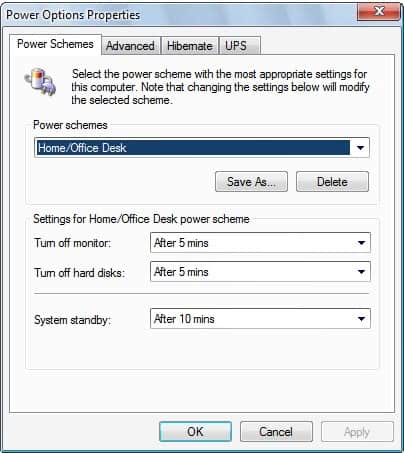7 Computer Energy Saving Tips

The following guide provides you with tips on how to save energy when you use a computer. Energy saving is important these because of rising costs, but you have other motivation for cutting down the energy used by your electronic devices.
While the price of energy may be the prime motivation to cut down on the costs there are other benefits in regards to computer systems. A computer system that saves energy will produce less heat. This is important in the summer months where heat can lead to all sorts of computer problems, and also an increased noise level as the computer fans try to cool the components.
Computer systems consume power. The amount of power depends on the system at hand. It can vary widely depending on the hardware. A high end user's computer with the latest hardware will consume more power than an Office computer system that uses low end hardware. High end computer systems use 250 Watts or more per hour which equals 1 kWh every four hours of usage. The US average energy costs in 2009 for 1 kWh are $0.11. This varies a lot in the country but also worldwide. The costs of 1 kWh in Germany averages around $0.27 for example.
A computer running 24 hours a day using 100 Watts per hour will need 876 kWh a year which would equal $96 when using the US average and $236 in Germany. If the computer uses 250 Watts instead the costs would rise to 2190 kWh per year which would equal $240 in the US and $591 in Germany. Not all computer systems are running 24 hours though but it is probably good to know the maximum. Keep in mind that energy costs are on the rise and that it will also reduce heat and noise.
1. Buy energy efficient products

Considering energy efficient products is a good way to save energy in the first place. Look for logos like the Energy Star to buy computer hardware that offers a good energy efficiency. Another good idea is to look for a 80+ power supply unit which is more energy efficient as well. (See 80 Plus Power Supply Units)
You may also save energy when you buy components designed for mobile use, or components that come with extra energy saving features.
2. Use build in power saving features
Most operating systems come with power saving features that put hardware like hard drives or the computer monitor into idle mode or turn them off for the time they are not being used.
Idle mode consumes between 20 to 50 times less energy. Windows users find the power saving settings in the Control Panel or Settings application. It may be necessary to tweak the values for turning off the computer monitor, hard drives, and system standby so that they have no negative on your work. A shorter time period will save more energy but is also likelier to affect work.
This also includes the possibility to underclock hardware. A high end video card is only needed with its full power when playing the latest computer games. It is definitely not needed in most other situations. Underclocking the video card will save energy (read create video card profiles to save power) The same is true for processors.
3. Turn down the brightness
Turning down the brightness of the computer monitor, or any other monitor actually, saves energy. This is actually a good tip for users with laptops, netbooks and other mobile devices including cell phones. It can also be helpful on desktop systems. It is enough to turn the brightness down to 50%, as you won't get much benefit when you turn it down further.
4. Turn off the monitor instead of using a screensaver
Screensavers do not save energy. Their function these days is reduced to visuals only. Turning off the computer monitor instead of running screensavers saves lots of energy.
5. Disable devices that are not needed
Laptops come with all sorts of devices that a user might not need. Each of the devices - if enabled - consumes energy especially if it is active.
A laptop user that uses the build in network adapter and a cable to connect to the Internet probably does not need Wi-fi, the build in modem, Bluetooth or infrared. The same might be valid for other devices like the DVD drive or sound card.
6. Turn off the computer
This might be an obvious tip but there are a few myths surrounding this. Some users think that turning off a computer will reduce its lifetime. Others believe that it will cost more power to turn the computer off and on again than to put it to hibernate mode.
It might not make sense to turn off a computer system when going on a 5 minute break but it definitely make sense for longer breaks, e.g. lunch or meetings.
7. Share hardware where appropriate
Hardware like printers, scanners or routers that are connected to a computer system are also using power. A way to save energy is to share these devices where possible. This does require some computer knowledge though.
Energy Saving Verdict: It is possible to save lots of energy by turning off devices when they are not needed. Buying energy efficient hardware and using power saving settings are the two other helpful options.
Do you have anything to add? Let us know in the comments.




















so very good tips
:)
Nice Tips plus mention of edison software. I’ll try that.
Martin, the new template looks very beautiful but you have not changed the favicon.The orange globe in the logo will look great.
great idea mutant, done :)
i’ve tried the edison software (where it telles you how much you save if you do that stuff) it says i’d save something like 20 $ a year) and that not worth my while to be off on all day…..
but what i do is using the hibernet option – for security reasons mostly
Very nice tips . point#4 you could use MonitorES (http://code.google.com/p/monitores)
Thanks,
Umakanthan